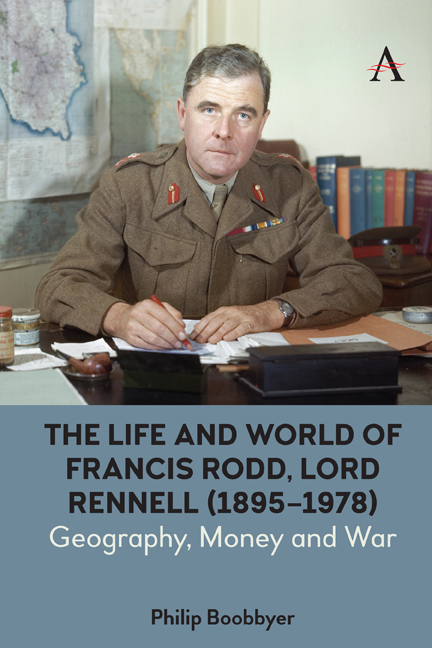Book contents
- Frontmatter
- Dedication
- Contents
- List of Figures
- List of Abbreviations
- A Note on Names
- Acknowledgements
- A Personal Note
- Introduction
- Chapter One Family and Youth
- Chapter Two The First World War
- Chapter Three Into the Sahara
- Chapter Four International Banker
- Chapter Five Negotiating with Italy
- Chapter Six West Africa, 1940
- Chapter Seven East Africa in Transition
- Chapter Eight AMGOT (Allied Military Government of Occupied Territories)
- Chapter Nine ‘Jack of Many Trades’
- Conclusion
- Sources and Bibliography
- Index
Chapter Six - West Africa, 1940
Published online by Cambridge University Press: 09 February 2021
- Frontmatter
- Dedication
- Contents
- List of Figures
- List of Abbreviations
- A Note on Names
- Acknowledgements
- A Personal Note
- Introduction
- Chapter One Family and Youth
- Chapter Two The First World War
- Chapter Three Into the Sahara
- Chapter Four International Banker
- Chapter Five Negotiating with Italy
- Chapter Six West Africa, 1940
- Chapter Seven East Africa in Transition
- Chapter Eight AMGOT (Allied Military Government of Occupied Territories)
- Chapter Nine ‘Jack of Many Trades’
- Conclusion
- Sources and Bibliography
- Index
Summary
Rodd left for West Africa in June 1940 with a position in military intelligence. His active involvement in intelligence can be traced to November 1938 – at that time he was accepted into the Officers’ Emergency Reserve and earmarked for intelligence duties. A few months later, he was called in to the War Office for a chat with Gerald Templer, a lieutenant-colonel in military intelligence responsible for training the intelligence corps. Templer was answerable to Major-General Frederick Beaumont-Nesbitt, deputy director of military intelligence from August 1938 to September 1939, and thereafter director until December 1940, following the division of the Directorate of Military Operations and Intelligence into two sections. Another former Etonian, Beaumont-Nesbitt had been married to one of Rodd's cousins, Cecilia Bingham. Templer, supported by Beaumont-Nesbitt, was eager to develop plans for irregular warfare. On this, he kept in close contact with MI(R), a unit within Section D of the Secret Service, based at Station XII at Aston House near Knebworth, also working on clandestine operations. From spring 1939, MI(R) was headed by Major J. C. F. Holland, a strong supporter of covert operations. It included Holland's friend Major Colin Gubbins, author of The Art of Guerilla Warfare (1939) and The Partisan Leader's Handbook (1939) – pamphlets with which Rodd was familiar – and subsequently a key figure in the Special Operations Executive (SOE) set up in July 1940 under the umbrella of the MEW. The history of the Arab revolt was influential in these circles. Holland put Lawrence's Seven Pillars of Wisdom on the essential reading list for all MI(R) personnel.
Following the meeting with Templer, Rodd and Haslam went on a visit to West Africa, which included visits to the Gold Coast and Nigeria. In the Gold Coast, Rodd and Haslam were received at the highest level; on arrival in Accra, they lunched with the governor Arnold Hudson at Christiansborg Castle. They also visited Achimota College, a school for educating young Africans that impressed Rodd hugely. ‘It is one of the really good pieces of work in Africa and makes up for a lot of the sordidness of colonial life especially among Europeans especially on the G. Coast’, he reported to Mary.
- Type
- Chapter
- Information
- The Life and World of Francis Rodd, Lord Rennell (1895–1978)Geography, Money and War, pp. 119 - 136Publisher: Anthem PressPrint publication year: 2021



